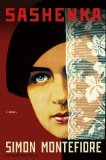Most professional historians who write books tend to write nonfiction works in their particular field of study. Simon Sebag Montefiore has not only done that with his studies in Russian history, his biographies of Soviet dictator Josef Stalin were both award-winning bestsellers. Montefiore has since decided to apply his knowledge to the world of historical fiction. And while he may not find the same success with his first novel, Sashenka, his skills as a historian are fully on display and put to use.
 We first meet the title character, Sashenka Zeitlin, in 1916, the 16-year-old daughter of a wealthy Jewish arms merchant in St. Petersburg. While her father has ties to the Tsarist regime and her mother socializes with Rasputin, Sashenka has been captivated by Marxism. Her uncle trains her to become a Bolshevik operative who, among other things, is encouraged to try to turn a high-ranking police official into a double agent — who intends to do the same with her. By the time the Tsarist regime falls, Sashenka becomes a secretary for Lenin.
We first meet the title character, Sashenka Zeitlin, in 1916, the 16-year-old daughter of a wealthy Jewish arms merchant in St. Petersburg. While her father has ties to the Tsarist regime and her mother socializes with Rasputin, Sashenka has been captivated by Marxism. Her uncle trains her to become a Bolshevik operative who, among other things, is encouraged to try to turn a high-ranking police official into a double agent — who intends to do the same with her. By the time the Tsarist regime falls, Sashenka becomes a secretary for Lenin.
Montefiore then takes us to 1939. Sashenka has become the model Soviet woman. She and her husband, an official in the NKVD, are among the Communist upper echelon who have survived Stalin’s “Great Terror.” Even though Stalin himself is a guest in their dacha, they ultimately discover that the end of mass purges doesn’t render even loyal longtime Communists immune from the whims of Stalin and his secret police apparatus When we last see Sashenka in this section of the book, she is writing a confession in the NKVD’s Lubyanka Prison.
The novel concludes in 1994, after the fall of the Soviet Union. A young Russian historian is hired to solve the mystery of what ultimately became of Sashenka and her family. This is actually where Montiefore’s fiction talents are at their best. He manages to turn a plot based largely on someone digging through Communist archives — both open and closed — into a rather gripping story. This undoubtedly reflects what Montiefore himself has been through in writing his biographies of Stalin and enables him to turn a young female historian into a sleuth whose efforts have a surprising resolution.
One problem with the work, though, is that this section comes more than 350 page into the book. The book’s descriptions of pre-revolutionary Russia and Stalin’s Soviet Union will undoubtedly intrigue and entertain those with an interest in Russian history. Still, even they at times may feel somewhat worn by the amount of detail and some character usage that feels a tad disjointed. This also poses the risk that the detail may be too extensive to retain a reader more keen on a fast-paced story than a leisurely exploration of early 20th Century Russian life. Pleasure delayed may, in fact, turn into pleasure denied for some readers.
This is also a somewhat narrow, albeit interesting, examination of a particular slice of Russian life. Montiefore indicates in the acknowledgments that he wanted to write about how “an ordinary family” coped with these tumultuous periods. But Sashenka and her family aren’t really an ordinary family. They were among the aristocratic class in Tsarist Russia. Until themselves coming afoul of Stalin, they were among the Communist elite in the U.S.S.R. Their tale is ordinary only in the sense that, like millions of other Russians, they suffered through the pangs of revolution and the cruelty of Stalinist Russia. Sashenka is much more a tale of Bolsheviks and Stalinists grinding up and eating their own than a look at the everyday lives of average citizens..
That said, although Montefiore’s writing style is more expansive than in his nonfiction works, the ability to tell a story that made Stalin: The Court of the Red Tsar and Young Stalin bestsellers helps make the novel equally readable. Montefiore is successful in using a novel to take us inside significant historical periods in Russia and his background particularly helps illustrate the maze of Stalinist politics and tyranny. That cannot be said for the first foray into the world of fiction for many nonfiction writers.
These archives are as sacred as Golgotha. … The very paper smells of blood.
Simon Montefiore, Sashenka








